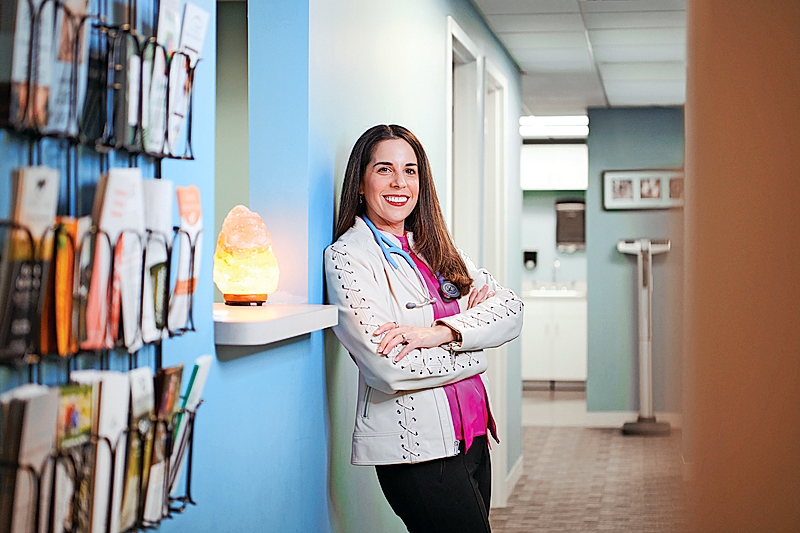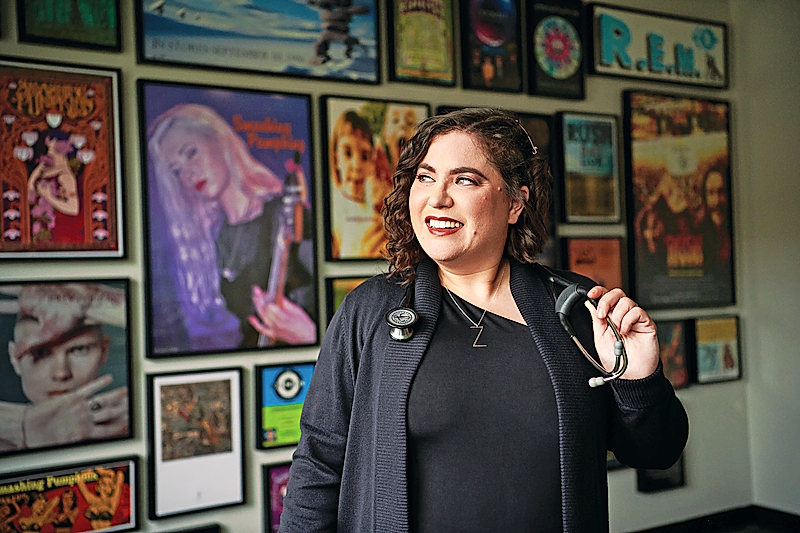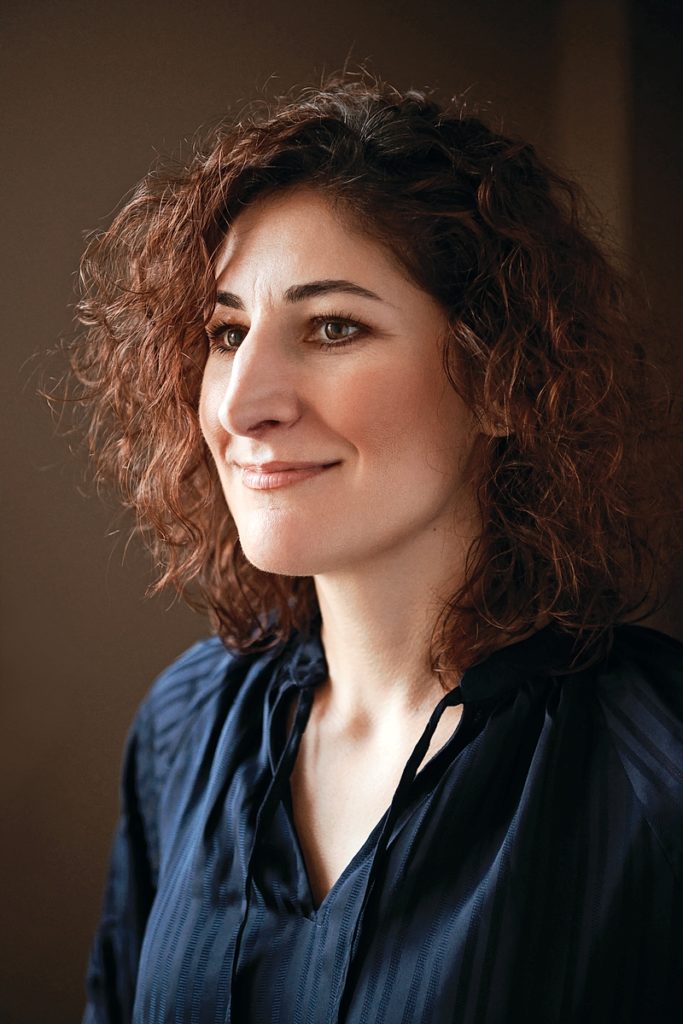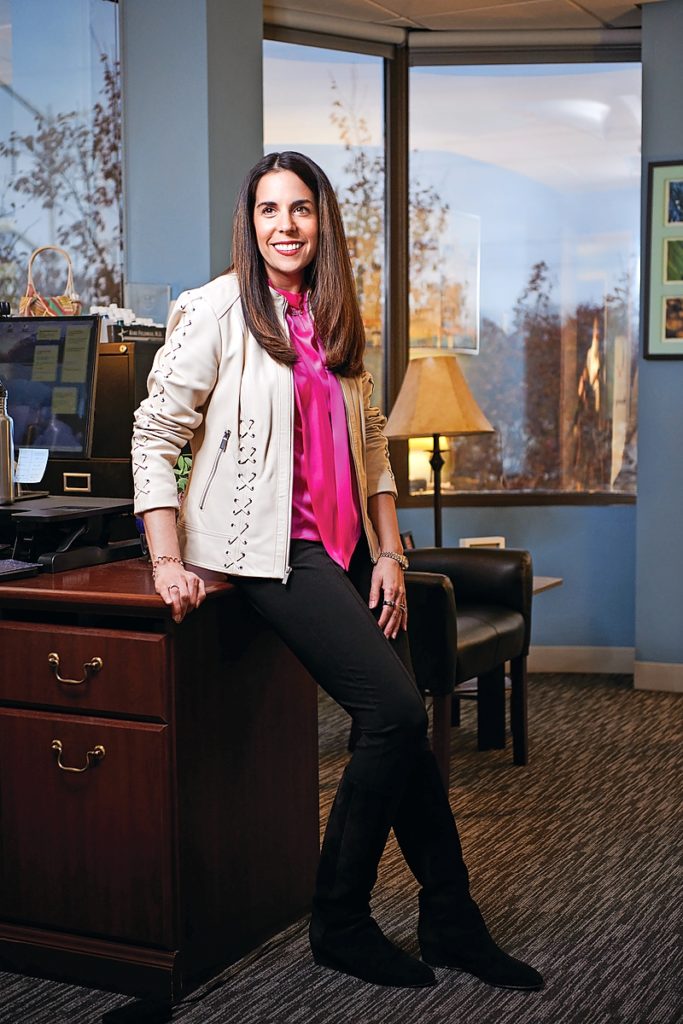Radical Health
By Lisa Arnett
January 2022 View more Featured

As clichéd as they’ve become, New Year’s resolutions like “eat better,” “exercise more,” or even just “get healthy” all stem from a place of wanting to feel better in one’s own skin. Here in the western suburbs, a number of heath care practitioners are dedicated to helping people feel better for good, all year long—whether that be healing from a mental health hurdle or getting to the root of lingering pain symptoms. The start of the new year feels like just the right time to meet three providers whose personal experiences helped set them on the path to starting their own practices. Though their approaches differ, what they all have in common is a passion for helping people live healthier lives—and the deep commitment to do so in their own way.
Story by Lisa Arnett
Photography by Olivia Kohler

Solving mysteries with science
Sarah Zielsdorf was one of those kids who told everyone she wanted to be a doctor when she grew up. “I actually was born a preemie and my esophagus and trachea were joined together—that’s not compatible with life,” Zielsdorf says. After a successful surgery and NICU stay, her parents were able to take her home from the hospital. Four years later she met the surgeon who’d operated on her and, as a preschooler, Zielsdorf felt her fate to become a doctor was sealed. “Ever since then, that’s what I wanted to do,” she says.
Sarah J. Zielsdorf, MD, MS, started her own practice, Motivated Medicine, inspired in part by her own battle with an autoimmune disease. “We see chronically ill patients who haven’t been given an answer,” she says. Zielsdorf also serves as a medical and research advisor and the director of education for LDN Research Trust, a UK-based organization that funds clinical trials and promotes awareness about low-dose naltrexone (LDN) as a treatment for autoimmune disorders.
She earned her master’s degree in public health, microbiology, and emerging infectious diseases from the George Washington University and her medical degree at Loyola University Chicago Stritch School of Medicine. After, she completed her residency in internal medicine with Loyola University Medical Center and Edward Hines, Jr. VA Hospital. Something happened on the way, though: Zielsdorf became very ill herself. From college through med school, Zielsdorf faced problems with her own health. She was diagnosed with hypothyroidism at age 19 and put on thyroid medication, but continued to struggle with her health. A decade later, after countless doctor visits and eventually pursuing her own research, she was diagnosed with Hashimoto’s, an autoimmune disease.
All that time feeling lost and overlooked in the medical system inspired Zielsdorf to start her own practice. She earned a certification from the Institute for Functional Medicine in 2018 and founded Motivated Medicine (480 E. Roosevelt Rd., Ste. 105, West Chicago, 630.492.1965, motivatedmedicine.com) in 2019 to help chronically ill patients find the underlying cause of their symptoms.
“We can get to the roots of why this person has this, instead of just giving this person medicine,” Zielsdorf says. “When I’m able to find [the cause] early, I’m able to help people in a way I wasn’t able to be helped.”
Zielsdorf isn’t big on labels, but says her approach is best described as translational medicine, meaning she relies on the latest research and data to drive patient care. “I enjoy very much being the person that is able to put together a very complex pathophysiology, putting together the labs and the data and the person’s story and piecing it all together and being a sleuth and getting that answer that no one else found,” she says.
One of the most exciting moments for Zielsdorf is the arrival of a patient’s lab test results. “Looking at laboratory data is like Christmas for me,” she says. “That’s my favorite thing to do because I really like to dig into the data, and most doctors are trained to just see what’s high and low on the page. But what we look for is how all of that is connected. Sure, it looks fine. But is it optimal?”
Zielsdorf sees patients virtually and in person and operates with a fee-for-service model, outside of insurance. “That’s how Motivated Medicine was born, out of my desire to have a practice that was completely independent and having the ability to not compromise anything,” she says. The name also indicates how important the doctor-patient relationship is to Zielsdorf. “I named my practice Motivated Medicine because it’s a two-way street of having a motivated patient and the clinician being absolutely dialed-in and having a passion to help optimize one’s health. It has to be both,” she says. “Patients that come in and say, ‘I need you to fix me,’ I tell them, ‘I don’t fix things. We work together to find ways for your own body to help your health.’ ” Treatment plans might include anything from prescription medication to nutritional supplements to stress management or lifestyle changes. “Sometimes, I’ve written prescriptions that say ‘Quit your awful job’ or ‘Leave your abusive husband’ … or ‘Get outside and spend some time in nature,’ ” Zielsdorf says.
She often calls upon her background in microbiology—especially with patients who have chronic digestive issues—as the trillions of microbes in the digestive tract play an essential role in digestion. “I like to say: You are really a big group of microbes with a freeloading human body,” Zielsdorf says. “The science of this is complicated at best and just completely neglected by Western medicine at worst. … But the science of this is so radically changing on a minute-to-minute level, and it’s so fascinating and so overwhelming.” Above all, Zielsdorf is passionate about keeping up with the latest research and bringing that back to the bedside to guide patient care. “I call this an impossible job, not because it can’t be done, but because I’m never satisfied and I’m always seeking answers,” she says.
As of presstime, Dr. Zielsdorf was not currently accepting new patients, but is in the process of expanding her team to open up additional availability in 2022.

Connecting Minds and Bodies
Kristen Kauke was a busy grad student at University of Chicago when she first tapped into the restorative powers of yoga. While earning her master’s in clinical social work, the stresses of the high-pressure environment were weighing on her. “I started realizing that this academic achievement—this doing, this achieving—didn’t equate to life satisfaction,” Kauke says. “That’s when I turned to yoga, and that helped me find some peace in the stress and began a love affair with yoga.”
Kristen Kauke, LCSW, is a licensed clinical social worker, registered yoga teacher, and Ayurvedic yoga specialist. She started Wellness Within of Fox Valley in 2018 to combine her background in mental health counseling with principles of yoga and Ayurveda, an ancient system of natural medicine. She has also authored three books and teaches at Prana Yoga Center in Geneva.
Kauke grew up in Arlington Heights and has lived in the Fox Valley area for 22 years. During her years practicing social work in both clinical and school settings, she decided to also train to become a yoga teacher.
“I thought: Holy cow, so much of what I’m learning [in yoga teacher training] has parallel themes that I learned from counseling,” she says. “Yoga said it first—5,000 years ago first. We just continue to repackage it.” When Kauke then pursued advanced yoga teacher training, she was introduced to the ancient healing modality of Ayurvedic medicine. “It is the sister science to yoga,” she says. “Ayurveda is creating a healthy lifestyle and it addresses all levels of health: physical, mental, emotional, and spiritual. It offers practices for cleansing and nourishing, and lifestyle modification to support well-being and long-term health.”
Kauke soon found herself at the intersection of mental health counseling, yoga, and Ayurveda, inspired by how she could help people with all three. “I was seeing all these clients, they are going to bed at 2 a.m., eating like crud. … I just felt that mental health has to involve the body and lifestyle,” she says. “If I am going to continue to do the work that I do, I want to be able to do it my way and incorporate these aspects.”
And so in 2018, she opened her own practice, Wellness Within of Fox Valley (303 N. 2nd St., Ste. 24, St. Charles, 630.463.9070, wellnesswithinfoxvalley.com). There, Kauke provides counseling in person or virtually for clients with mental health diagnoses, either through insurance or self-payment. “That [counseling] is yoga informed, but it is to improve the wellness of that diagnosis, whether it be generalized anxiety disorder or a major depressive episode,” she says. “If the client is saying, ‘I lay in bed and I can’t fall asleep because my mind is racing,’ I might suggest a yoga breath technique to help calm the mind and body, and maybe we would start there. I often tell my clients: Mental health can’t happen unless we are breathing, moving, sleeping, and nourishing our bodies well. If not, something is going to flare.”Kauke also helps clients with life transitions, grief, and other sources of stress. “We are still living in a pandemic and the central nervous system wasn’t designed to know how to do this cumulative stress,” Kauke says. “We all feel it. Sleep is fragmenting. There’s more divisiveness. People are angry. We are not listening [to each other].”
In these pandemic times and before, Kauke says one of the most satisfying things about her work is practicing the lost art of listening every day. “That always feels rewarding when a client knows they have been seen and heard,” she says. “I firmly believe that from that place of listening, transformation can begin.”
Kauke also loves teaching techniques that use the body as a tool and resource. “We always have our breath with us and have our bodies with us, and how do we use them for resilience? We don’t always need that adult coloring book or fidget spinner or a beer,” she says. “You can do a guided meditation and you might think, Oh, that felt good. And my body knew how to get back to a place of balance.”
Coming Soon At Wellness Within of Fox Valley, Kristen Kauke offers a wellness coaching program with three tracks: Root, Grow, and Flourish. “It’s to improve energy, health, and well-being and have that accountability piece. That’s what I really love, so that clients in general aren’t depending on therapy. They have these tools to feel empowered in their own life to make a change,” she says. The third part of the program, Flourish, debuts in early 2022 with monthly classes and access to recipes, reading lists, audio meditations, and more.

From surviving to Thriving
When Kori Feldman finished her residency with Loyola’s MacNeal Family Medicine in Berwyn, she found herself pulled in a different direction from many of her peers. “I was kind of discouraged from opening my own practice, to be honest. Not a lot of people from my residency really did that,” says Feldman, who grew up in Oak Brook and went to medical school at Rosalind Franklin University of Medicine and Science in North Chicago. “There was a lot of, ‘Are you sure?’ and ‘You can do that?’ I thought, Yes, I want to and I’m going to figure this out.”
Kori Feldman, MD, is a licensed, board-certified family medicine physician with a practice based in Oak Brook. She has hosted meet-up events for licensed health care practitioners through Functional Forum, an integrative medicine conference, from 2015 until 2019. “Ultimately, our biggest goal is to change the landscape of medicine in the Chicago area,” she says. Meeting and connecting with local practitioners is part of her mission and she plans to resume hosting quarterly meet-ups in 2022.
She was especially interested in practicing integrative and functional medicine, which are sometimes used interchangeably but have distinct meanings. “The way I always looked at it is integrative medicine is combining conventional medicine with alternative options—whether that’s chiropractic, herbal, nutrition, lifestyle, acupuncture, body work, or energy work,” Feldman says. “Functional medicine is more about getting to the root cause of why people are having certain symptoms. Integrative is about multiple things put together; functional is really about ‘why,’ … about getting to the root cause instead of just giving people a pill for an ill.”
To fuel that interest, Feldman did a rotation at the Andrew Weil Center for Integrative Medicine in Tucson, Arizona. She started her own primary care practice in 2008 in La Grange, called Integrative Family Health Associates, and operated under a traditional insurance model before a personal tragedy prompted her to change course.
“In 2010, my sister was suddenly and unexpectedly killed. It shook me up and made me really reevaluate what’s important and how much more effective can I be,” Feldman says. She continued to learn more about functional medicine and in 2015, launched a wellness program, Vitality Wellness Partners (vitalitywellnesspartners.com), to teach people the skills of being healthy. In 2018, she shifted her primary care practice to a direct primary care membership model outside of insurance and renamed it Vitality Family Health. Together, these two entities now make up Feldman’s unique hybrid practice, Vitality Family Health & Wellness Partners (2809 Butterfield Rd., Ste. 340, Oak Brook, 630.948.3300, vitalityfamilyhealth.com).
Stepping outside the traditional insurance framework was a key move for Feldman to practice root-cause medicine with the time and attention she felt her patients needed. Though Feldman says she feels health insurance—like car insurance—is crucial for acute care, like accidents and injuries, she felt the system was failing her patients with chronic health issues by focusing only on symptom management, not resolution. “People were not coming in because insurance was limiting them and [they] weren’t getting the care they need,” Feldman says. “We all got convinced that if my insurance doesn’t pay for things, I can’t do it and it must not be important. We were excited to shift to this model because it unshackled us from that system and allowed us to practice holistically, in the way we and our patients want to be cared for.”
At her primary care practice, Vitality Family Health, Feldman sees patients of all ages for in-person appointments. Patients pay a monthly fee, like a membership, which covers visits and provides wholesale access to lab tests, medication, and vaccines as well as discounted pharmaceutical-grade supplements and vitamins. “At our checkups [for adults], we do some extensive lab testing and sit down and talk about diet and lifestyle, because that’s what you need to work on to prevent things like a heart attack and stroke,” she says. Feldman describes the practice as “vaccine-friendly,” meaning she spends time discussing the benefits and risks of all vaccines with patients. “We are not anti-vaccine; we are pro-education,” she says.
Meanwhile, the wellness education side of the business, Vitality Wellness Partners, has shifted to a virtual model since the start of the pandemic. It offers a core curriculum to teach the basics of wellness along with individualized guidance suited to each patient’s medical needs. Feldman created the program based on five pillars of healthy living: detoxification, nutrition, fitness, hormone balancing, and coaching. “We put these five things together, and that’s where you get dramatic, long-term success,” she says.
The program generally isn’t the first step that most patients have sought out to try to improve their health. “They have been trying to get healthy a lot of different ways—dieting, exercise, maybe alternative practitioners, personal trainers and things like that—and not reaching their health goals with what they have been trying to do,” Feldman says. She often works with patients with autoimmune, thyroid or digestive issues, as well as people who want to reduce their medications for high blood pressure, high cholesterol, or pain.
At the end of the day, what Feldman finds most rewarding about her work is helping her patients get to a place where they are thriving, not just surviving.
“It is so unacceptable to me to have so many people struggling with lifestyle-
based issues because no one is educating and supporting them,” Feldman says. “Some people just need a little bit of education and support and better strategies for coping to be able to thrive. I love being in a position where I can really effect that kind of change for somebody.”


